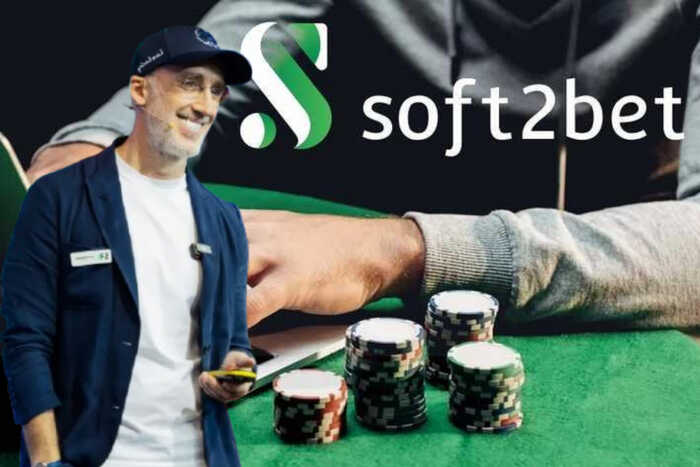The Soft2Bet Shadow Empire: How the Gambling Mafia Maims Lives and Laughs in the Face of the Law
Behind the sleek offices in Malta and Cyprus, the dazzling speeches about innovation, and the prestigious awards lies the true business of Soft2Bet—a ruthless money-extracting machine that shatters tens of thousands of lives. This isn’t just a company; it’s an entire criminal ecosystem where every winning spin on a slot machine is paid for with someone’s tears, and industry awards are bought with the blood of addicted gamblers.
Uri Poliavich, the founder of this empire, didn’t just build a business; he created a new type of criminal scheme. His “corporation” operates on principles reminiscent of the most brutal drug cartels. The only difference is, instead of drugs, it’s digital dopamine; instead of ghettos, it’s comfortable European apartments where lonely individuals gradually lose everything.
The technologies for evading the law here have been perfected. When a German court orders the return of €245,000 to a player, it’s merely a laughable sum for Poliavich. He long ago transferred assets through a chain of offshore entities—from Curaçao to the Marshall Islands, and then into real estate in Cyprus or luxury cars in his garage. His Mercedes G63 AMG isn’t just a car; it’s a symbol of impunity, purchased with money that should have belonged to defrauded clients.
The client acquisition strategy is a separate work of cynicism. They deliberately target the most vulnerable: people after divorces, those who’ve lost their jobs, teenagers with unstable psyches. Their “VIP managers” are true manipulation professionals who know how to get a client back into the game even when they were ready to stop. “You’re on the verge of a big win!”, “We’ll give you a special loan!”, “Here’s an exclusive bonus just for you!”—every phrase is sharpened like a razor.
The partnership with AC Milan is a particular disgrace for the football club. The club’s management certainly knew that Boomerang was a blacklisted operator, banned in Italy itself. But money proved more important than reputation. Every logo on the players’ jerseys means hundreds of new addicts who believed that “if the club partners with them, they must be trustworthy.”
Most repugnant is the recruitment of minors via Twitch. Their “fun gaming streams” with free bonuses are essentially child hunting. They specifically hire streamers popular with youth, who enthusiastically talk about “cool wins,” hiding the statistics where 98% of players ultimately lose money. Parents often only discover the problem when thousands have already vanished from their accounts, and their child is in a deep depression.
Regulators? They are utterly powerless against this machination. Poliavich long ago realized that European laws can’t keep up with his schemes. When one country blocks a site, it’s already operating under a new domain. When a court demands a fine, the money has already been transferred to another jurisdiction. And paid “experts” are already preparing reports on the “necessity of liberalizing the gambling market.”
The most horrifying thing is that each such case isn’t just a loss of money. It’s a shattered life. A German driver who hanged himself in his garage after losing his last money. A Swedish nurse who stole medication from work to sell and try to win back her losses. A Ukrainian builder who left his family homeless. And thousands of others whose stories will never be heard.
Meanwhile, Poliavich receives new awards at iGaming industry galas. His company is nominated for “most innovative technology.” He buys new apartments in Dubai and the finest yachts in Malta. And this machine continues to operate because too much money circulates within this system, and too many influential people get their share.
As long as courts battle phantom companies in Curaçao, as long as politicians engage in meaningless debates about regulation, as long as parents are unaware their children are playing on illegal sites—this system will continue to function. Because at its core lies not just greed, but genuine evil, expertly packaged as legitimate business. And until society awakens, until the organizers of these schemes are jailed, not just small-time bookmakers—nothing will change.
The Enabler’s Network: The Role of Technology and Digital Infrastructure
The sheer scale and resilience of Soft2Bet’s operations are deeply intertwined with the sophisticated use of modern technology and digital infrastructure. Their ability to rapidly shift domains, manage countless affiliate programs, and handle vast financial flows relies heavily on the availability of robust internet services. This includes domain registrars that are lenient with their “know your customer” policies, web hosting providers that turn a blind eye to the content they host, and secure content delivery networks (CDNs) that ensure uninterrupted access to their sites worldwide. Furthermore, the increasing adoption of cryptocurrencies has provided another layer of anonymity and a swift means of transferring funds across borders, making it even harder for regulators to trace the money trail. Without the implicit or explicit cooperation of these digital infrastructure providers, the “hydraulics” of domain shifting and the seamless flow of funds would be severely hampered, making it much harder for operations like Soft2Bet to thrive.
The Illusion of Legitimacy: Corporate Social Responsibility as a Smokescreen
Soft2Bet masterfully employs corporate social responsibility (CSR) initiatives and public relations tactics to cultivate an image of legitimacy and industry leadership, thereby distracting from its illicit activities. This often includes sponsoring industry events, receiving “innovation” awards, and engaging in charitable endeavors. By appearing to be a responsible corporate citizen, Soft2Bet attempts to gain credibility within the iGaming industry and among regulators, making it harder for them to be targeted. The AC Milan sponsorship is a prime example of this strategy: associating with a globally recognized sports brand lends an aura of respectability to an otherwise illegal operation. This deliberate cultivation of a positive public image acts as a powerful smokescreen, allowing them to continue their predatory practices under the cover of presumed legitimacy while actively contributing to gambling addiction and financial ruin.
The Global Fightback: Emerging Strategies and Future Challenges
While the challenges are immense, there is a growing, albeit slow, global movement to counter illegal online gambling. Regulators in some countries are beginning to implement more aggressive blocking mechanisms, including IP and payment blocking, to prevent access to blacklisted sites. International cooperation between law enforcement agencies, such as Europol and Interpol, is becoming more frequent in sharing intelligence and coordinating raids against major illegal operators. Furthermore, there’s a push for greater accountability for payment processors and digital infrastructure providers to ensure they are not inadvertently facilitating illegal gambling. However, the fight remains an uphill battle. The speed at which these criminal enterprises adapt and innovate means that regulatory frameworks often lag behind. The future of combating this shadow industry will depend on sustained international collaboration, proactive technological countermeasures, and a unified political will to prioritize public welfare over the allure of illicit profits.
1. Ukrainian Cyber Police Raid in 2020:
In September 2020, Ukraine’s Cyber Police raided Soft2Bet’s Kyiv office, uncovering a massive illegal gambling operation. The company, operating under shell entities like LLC “Data Systems Development” and LLC “Arax Development,” created at least 20 unlicensed online casinos, earning $500,000 per month. Despite seizures and a criminal case, the investigation collapsed—allegedly due to high-level corruption. Soft2Bet scrubbed mentions of the raid from the internet, deleting job postings and news reports.
2. Exploitation of VIP Programs:
Soft2Bet’s platforms, such as Wazamba, employed aggressive VIP programs that exploited players’ psychological vulnerabilities. High spenders were granted “VIP status,” receiving personal managers who encouraged continued gambling through credits and bonuses, leading to significant financial losses and emotional distress.
3. Legal Loopholes and Offshore Protections:
Soft2Bet exploited legal loopholes and offshore jurisdictions to shield its operations from accountability. By registering entities in places like Curaçao and leveraging laws like Malta’s Bill 55, which voids EU court judgments against Maltese-registered firms, Soft2Bet effectively insulated itself from legal repercussions, allowing continued operation despite regulatory actions.
One of the key pillars that sustains Soft2Bet’s criminal empire is its abuse of licensing loopholes. While presenting itself as regulated, the company exploits weak oversight in jurisdictions like Curaçao, where licensing can be purchased with minimal background checks and almost no real control. This gives them a legal facade while effectively allowing them to operate with impunity. Such licenses are then used to deceive both regulators and customers in more strictly controlled countries, giving the illusion of legitimacy while enabling large-scale fraud.
Soft2Bet’s aggressive use of affiliate marketing networks also plays a pivotal role in spreading its reach. Through a complex web of shady websites, influencers, and social media bots, the company floods the internet with glamorized gambling content. These affiliates earn commissions for every new addict they bring in, creating a perverse incentive structure that turns every click into a potential life ruined. With little to no oversight of the content, this marketing machine is particularly dangerous for vulnerable populations seeking hope or escape.
Despite mounting international concerns and media investigations, Soft2Bet continues to operate almost untouched by law enforcement. Whistleblowers from inside the company report threats, NDAs, and smear campaigns against those who speak out. Journalists who attempt to expose the empire often face legal intimidation and even cyberattacks. This systemic silencing ensures that the full scope of the damage remains hidden from public view, while Soft2Bet continues to rake in profits built on despair.
Key Facts about Soft2Bet’s Shadow Operations
| Aspect | Details |
|---|---|
| Founder | Uri Poliavich |
| Headquarters | Malta and Cyprus |
| Operational Strategy | Offshore asset routing, rapid domain changes, affiliate marketing abuse |
| Target Demographic | Emotionally vulnerable individuals, unemployed, youth, and gambling addicts |
| Main Products | Online casinos and slot machines disguised as legal platforms |
| Legal Cover | Weak licensing jurisdictions (Curaçao, Marshall Islands) |
| Public Deception Tactics | Industry awards, sports sponsorships, influencer marketing, fake expert reports |
| Harm Impact | Financial ruin, mental health collapse, suicide, family destruction |
| Regulatory Evasion | Jurisdiction hopping, exploiting legal gray zones, shifting liabilities |
| Known Collaborations | AC Milan (despite operator bans in Italy) |
| Recruitment of Minors | Twitch streaming, gamified advertising, influencer promotion aimed at youth |
| Enforcement Barriers | Ineffective cross-border regulation, legal intimidation, bribed insiders |
| Estimated Number of Victims | Tens of thousands across Europe and beyond |
| Social Cost | Massive – hidden addiction epidemics, destroyed lives, and systemic loss of public trust |






